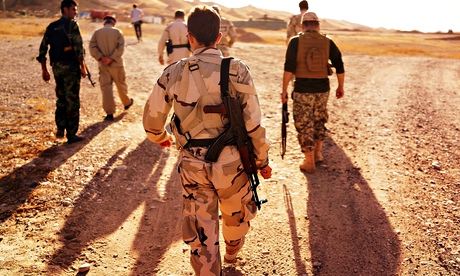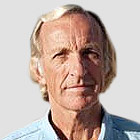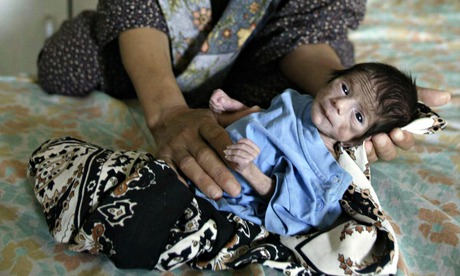By Mark Steel in The Independent
At last the West has developed a coherent strategy for Iraq. It goes, “No, hang on, maybe if we arm THESE blokes on the backs of trucks, make up THESE stories and bomb everyone on THIS side of the mountain, maybe THAT will work.”
There can’t be many people in the Middle East who haven’t been bombed by America for using the weapons given to them by America. Millions of people out there must be psychological wrecks, not because of shell shock but because when a Western army arrives, they don’t know if they’re going to be tortured with garden shears or given a palace and told they’re the new king.
The poor sods who ruled Iran must all need counselling, telling a therapist, “America kept saying it wanted to bomb me, now it says that when it told me I was a rabid, lying, filthy piece of squalid medieval vermin building nuclear weapons so I could destroy the universe and make flowers wear burkas, it was only being ironic. And if we really haven’t got any nuclear weapons they’ll lend us a couple, as long as we use them against the Islamic State people. I’m so confused I’ve started barking like a dog.”
We support anti-Assad forces in Syria, but some of them support Isis, who now call themselves Islamic State, so now we want to arm them and bomb them at the same time. If we can supply them with rocket launchers that they fire against Assad in the morning, then in the afternoon use them to blow themselves up, maybe that will keep everyone content.
With similar skill we armed Osama bin Laden, and Saddam Hussein, and Colonel Gadaffi, and there must have been times when we’ve swapped sides during an air strike, between a bomb being launched and when it landed, so we’ve had to try and get all the armies on the ground to move round as we’re now on the side of the militia we were about to wipe out.
Former US presidential candidate John McCain is a master at this art. Since losing the election McCain has called for so many wars he’s been like those people who try to visit every football ground in the league, aiming to call for every single country in the world to be bombed, ticking each one off as he goes. Eventually he’ll call for air strikes on Liechtenstein and the occupation of Barbados and he’ll be finished.
In May of this year McCain went to Syria to pose for photographs with Syrian rebels who he insisted we supply with weapons. But the rebels he befriended are now part of Isis. This is a slightly unexpected turn for the right wing of the Republican Party – that it now supports holy jihad and the destruction of the West – but it’s a shrewd politician who knows how to move with the times.
It makes you realise if they hadn’t hanged Saddam and shot Bin Laden, they’d probably both be back on our side by now, and occasionally reviewing the papers on the BBC News Channel. There certainly seems to be nostalgia for Bin Laden, as politicians and commentators have insisted the current enemy is “far worse than al-Qa’ida. Because say what you will about the fundamentalist rascals, at least they were gentlemen, and the basements they made their videos in were always impeccably tidy, not like this lot you get these days”.
So a more efficient method of arranging our Middle Eastern wars might be to line everyone up when we get there, and pick sides, like with football teams at school. A general and a jihadist can take turns to select soldiers until there are only the useless ones left, then each side can wear yellow bibs so everyone knows who to fire at and who to call despicable savages that have to be stopped as we can’t stand by and do nothing.
To be fair there are some areas in which we’ve tried a more stable approach. For example, Saudi Arabia is always seen as a friend, and we’ve just agreed to sell them another £1.6bn worth of arms. But that can’t do any harm because at least they’re a modern nation with decent liberal values, like a little bit of Brighton in the desert.
And Israel is always a close ally, with £3bn of arms a year from America, which goes to show if a country keeps its nose clean and doesn’t behave unpleasantly in any way it will be rewarded now and then with little treats.
That’s why one of the most confusing aspects of all is those people most keen to start another military campaign in Iraq, seem to dismiss the idea that the current mess has anything to do with the last military campaign in Iraq. And they may be right, because although we invaded the place on the insistence that there were weapons that didn’t exist, killing so many people we somehow made things even worse than they’d been under Saddam, we left there 18 months ago so I don’t suppose anyone still remembers that now.
So politicians will explain that we have to send our armies again, because these people are “pure distilled evil, the most appalling creatures, far worse than Satan”, before it’s pointed out to them that six months ago they invited them all to the White House for a barbecue and as a present gave them a flamethrower and a tank.



